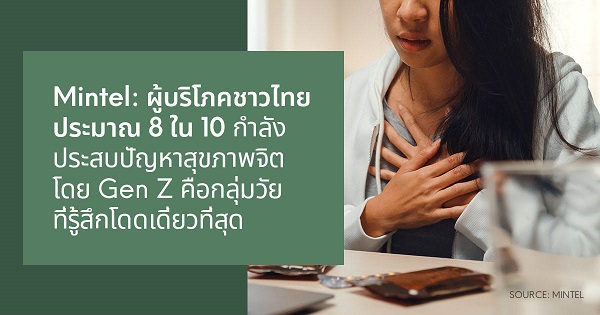About eight in 10 Thai consumers have experienced mental health issues in the past six months, with stress (46%), insomnia (32%) and anxiety (28%)* among the top three conditions, according to new research by global market intelligence firm Mintel.
Thais’ mental state has been exacerbated by the prolonged effects of COVID-19, which contribute to feelings of frustration and helplessness. Furthermore, the research finds that consumers at different life stages and genders face different mental health challenges.
Gen Z is the loneliest generation
Work/study (48%) particularly affected Gen-Z consumers aged 18-24, who are found to be the loneliest (38%) compared to other generations** like Older Millennials (26%) and Gen X (15%). Peer pressure (33%) and social media (25%) are among the factors that contribute to their mental health challenges.
“Over one-third of young Thai consumers say they lack self-confidence according to our research. The portrayals of a ‘perfect’ life on social media, seeing their role models, influencers or acquaintances possess things they do not have, and the pressure to live up to other peoples’ standards can lead to mental conditions like low self-esteem, depression and anxiety. Brands can support this younger population through campaigns that encourage positive self-satisfaction,” said Wilasinee (Kaimook) Siriboonpipattana, Senior Lifestyle Research Analyst, Mintel Reports Thailand.
Women are more stressed than men
Nearly one-third (31%) of Thai women aged 18-34 say they are burnt out compared to 17% of men of the same age group. Women attribute work/study, uncertainty in future planning and financial situation/responsibilities to be among the top factors that impact their mental health.
“Women aged 18-34 are likely to juggle household responsibilities, job stability, and their marriage. As noted in our new research on lifestyles of women, they want to stay balanced and healthy, both mentally and physically. Brands can target this group — particularly those with busy lifestyles — by offering products and services that reduce mental health stressors and help them commit to healthy activities,” continued Kaimook.
Sleep deprivation affects all generations
Mintel’s research reveals that sleep affects Thais regardless of age, which can be linked to stressful life events. Across generations, about 35% of Gen Z and Millennials have experienced insomnia compared to 28% of Gen X.
In contrast to popular belief, insomnia affects people of all ages, not just the elderly.
For instance, stay-at-home measures have blurred personal and professional life/study boundaries, leading to more stress and sleeplessness. Given that Thais struggle to sleep, brands can leverage new technologies to offer products or services that can detect sleep patterns and offer other health benefits.
Consumers look to brands to de-stigmatize mental health
Despite the increasing number of Thais experiencing mental health issues, consumers still lack access to mental health services and information. Over three-fourths (76%) of Thais agree that mental health should be discussed in public more often than before.
“Due to social constraints and stigma around mental health, we see high consumer expectations of brands in terms of mental health support. Considering its sensitive nature, brands need to show genuine empathy and understanding of consumers’ mental health journey.
Social media is growing in importance, with over three-fourths of consumers agreeing that it is a suitable channel for promoting mental products/services. As a result, brands that take a more active role in educating consumers, de-stigmatising mental health issues, and encouraging people to seek professional help will win over consumers,” Kaimook said.

